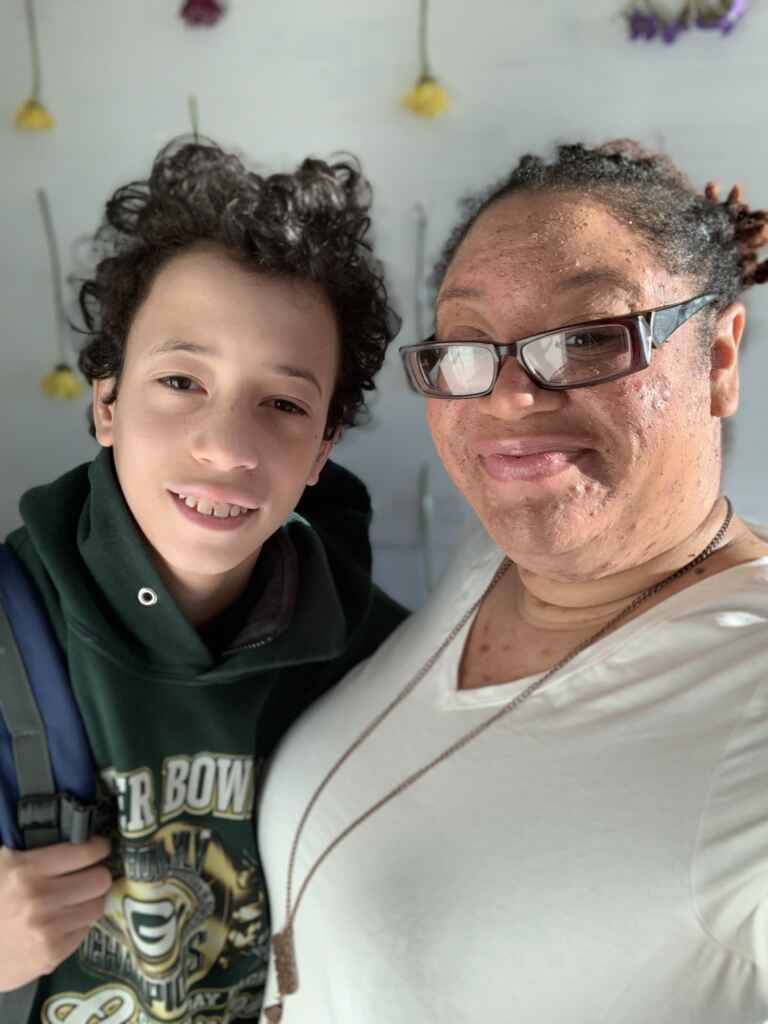In 2020, who would’ve thought that civil unrest would take a whole new light and platform the way it has?
While I’m emotionally rallying and physically calling all the numbers to do my part I look back at the emotional divide the current racial tension causes my son who may feel a bit torn, divided even, between what is right and what means safety for him.
While my colorism is not a facade for understanding the true oppression (psychologically, economically and politically) that Black people face daily, I was very naive in my own association and identity to the Black community until much later in my adult life. My two Black parents didn’t have a “race” discussion with me as I do now with all three (soon to be four) children. My sons are white, black and biracial; two teenagers and an elementary age child.
My oldest, biracial son will be 14 in October. He has ADHD and is being screened for High Functioning Autism Disorder (ASD). His father and I have been separated since he was two years old. My son lives with me, his Black mother. He’s a HUGE history buff. His most well versed topic is European History. He loves learning about wars. His books even though are diverse and reflect a high level of interest in the French Revolution and Norse Mythology. Because of both my and his father’s heritage, my son appears absolutely Caucasian. A stranger would not know he was Black if he was alone on the street. He would have to tell someone. If he remembers to tell someone.
He’s aware of the protests for equality amongst the Black Community. I’ve shared videos, stories, and personal testimonies of oppression in support of #BlackLivesMatter. He in fact was interviewed amongst our entire family about the recent racial riots and how our family talks about race by local NPR. His responses are minimal.
My oldest son identifies as being biracial. But the reality that he can choose how he associates with either race publicly has undertones. His white, biological father, in the past, has been absolutely liberal in him understanding and exploring typical, school textbook American history. During the summers he travels with his father: Washington D.C., Virginias and Canada. They visit civil rights museums together. Recently, his father took a trip to Ireland to visit & trace his own family history. Our son was extremely envious and attached to eagerly tracking down that part of himself.
As my son grew into being more of the “facts” person I noticed him lean heavy on the factual information he knew. He knows he has Irish lineage (on both sides of his parents tree) and he has a Black mom, a black brother, an adopted white brother and second dad (my husband) also white.
As the tv stations and the internet continue to share untold stories about the recent deaths of black men and women in America I have tried to have honest conversations about race with him. We’ve previously watched documentaries and social media videos that showcase both the horrific past of slavery and Jim Crow to the riots currently happening. We don’t sugarcoat anything to our kids. I just flat out ask: How does this make you feel?
Usually his response doesn’t come off as personal, it’s more of an analysis from a distance. He restates things we’ve encouraged him to stand up for in using his own whiteness to justly protect and stand up for others without it. In my observation only (and I could be eating my words later) he still hasn’t seen himself in the people he comes from. This is still personally disheartening and tough to swallow even though he knows he’s both Black and White.
Don’t get me wrong, I wasn’t expecting my biracial son to come out my womb with a raised black fist (he’s never seen me do this) or even be the one to associate everything he does in reference to black history or culture (which honestly happens more around February but we educate year round with trips, movies and documentaries often led by my white husband.) His brain is more complex in understanding empathy and registering social communication.
How else can I advocate for my teen son to know and love ALL of himself?
Here’s some valid thoughts we’ve unpacked through talks of identity:
Honor your Child’s Living History
Have you adopted a Black or multiracial child? Adoption is not only a reset of new physical and emotional life but a reset of what you choose to honor IN your child. It is important to acknowledge the parts that make your child unique, especially their ethnic, ancestral history. Honoring all of your child’s identity means also addressing your own cultural biases. There is the potential to create a mental divide and later a self damaging mis-shapen identity when we choose to dismiss this crucial part of their identity.
For any parent or caregiver raising a child not solely of their heritage: Take the time to acknowledge all the cultural aspects of your child and find a way to celebrate it. It may be uncomfortable or unknown to you at first, but establishing this educational foundation is psychologically proven to help cultivate strong positive identities in the world around them. Having diverse spaces at school, church and social groups helps in long term in positive developmental growth as well.
For parents with young children check out: https://www.familytreemagazine.com/premium/7-genealogy-activities-for-kids/
Don’t Pretend To Have All The Answers
I’d be a complete fool to come at my kid as a supreme wisdom leader. I can only speak from my experiences and the histories I know. That’s it. His experiences are different than mine and will continue to be, therefore I don’t have all the answers to help him. I try to provide honest direction based on a moral compass (ex: the police officer unlawfully cutting off George Floyd’s airway etc.) when he asks for it and help him find avenues to help him get the answers he’s looking for.
Check out: https://www.cbc.ca/parents/learning/view/talking-to-my-kids-about-being-mixed-race
Let Them Emote; Give Space
This is tough. If my biracial child feels safer not revealing upfront to the world he’s black, that’s his choice. He alone will have to come to terms with that. (Just as I did later in life.) Forcing my son (or any child) to acknowledge his cultural blackness or whiteness forces him to choose sides that can cause deeper psychological harm.
Remind them they are loved for who they are (ie. honest, hard working, humble, etc.) and not directly by what they associate to.
Making my son aware of systemic racism and the psychological effects that result from it is the greater effort I can make as a parent to him.

Keep Talking To Them
As things continue to happen and unfold in scary ways that challenge us, continue to promote and encourage necessary conversations. Kids will hear things beyond their home. Some will speak up about it while others will not and hold onto it in silence.
If we as parents/caregivers continue to allow an open platform of “no judgement, just communication” we can better construct safe spaces for all children from all backgrounds to question, challenge and open up about their connection and identity to the world.
Check out: https://nmaahc.si.edu/learn/talking-about-race/audiences/parent-caregiver




